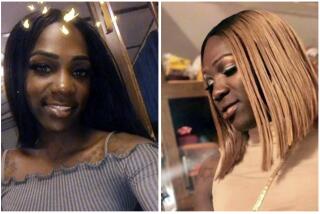No Defense Effort Made by Edwards in Girl’s Killing
- Share via
Thomas F. Edwards, acting as his own attorney, offered no defense Tuesday in the death-penalty case against him for the murder of a 12-year-old girl in Cleveland National Forest four years ago.
Edwards has told friends he wants the death penalty because he thinks he deserves it.
“Thomas knows God forgives him, but he can’t forgive himself,” said Shirley Pizzuto of Garden Grove, a close friend of Edwards. “He thinks death is the only thing to set him free of his tremendous guilt.”
Jurors began deliberations in mid-afternoon to decide just one issue: whether Edwards should be given a death penalty or life in prison without possibility of parole. Edwards was found guilty of first-degree murder in the Sept. 19, 1981, fatal shooting of Vanessa Iberri of Lake Elsinore, as she and a friend, Kelly Cartier, also of Lake Elsinore, walked along a path at the Blue Jay Campground. The Cartier girl survived a bullet wound to her head and was the key prosecution witness against him. Jurors could not agree on a death penalty recommendation, voting 9 to 3 in favor, forcing a mistrial in the penalty phase.
Asked Minor Question
Edwards, 41, fired his attorneys from the public defender’s office because he said he didn’t want them to try to save his life. He attempted to agree to a death sentence without a jury trial, but the judge refused. He was passive during jury deliberations and asked only one minor question during cross-examination of prosecution witnesses during the new penalty trial.
Last week, after the prosecution rested and it was time for Edwards to say whether he would defend himself, he asked for a week’s delay so he could consult his former attorney, Deputy Public Defender Michael Giannini. Superior Court Judge James F. Judge agreed.
But Tuesday, when Judge asked Edwards if he wanted to present a defense, Edwards rested after just one brief statement: “Because of the lies and distortions and the misuses and misappropriations and the stress of both the physical and the mental (sic), the defense rests.”
Giannini, informed that Edwards had not defended himself, said: “Oh, God, no . . . . What a tragedy.”
Need to Talk
Giannini said he could not reveal what Edwards and he talked about after Judge granted the delay but said it appeared Edwards “simply had a psychological need to talk to someone before going forward on this final round.”
Giannini said jurors have a one-sided view of Edwards.
“If you look at all the factors of this man’s life, what he was going through at the time of the shootings, you get a different view of him,” Giannini said. “He should be put away for the protection of society. But the death penalty? Not in this case.”
At Edwards’ first trial in 1982, several friends testified for him that he was highly upset during the weeks prior to the shooting because his wife had left him. Also, Edwards has a history of mental illness and has spent several years in mental hospitals.
Pizzuto said she offered to testify for him at his second trial as a character witness, but he would not let her.
“Thomas said he has used people all his life, and he isn’t going to use people for his own purposes anymore,” she said.
No Explanation
Despite the remorse that Edwards’ friends claim, neither the jurors at his two trials nor the families of the two girls have heard any explanation from him of why he shot them.
Edwards, driving a truck, had passed the girls, then waited with a .22 rifle for them to approach. The Cartier girl testified he said, “Girls,” or perhaps, “Hey, girls,” then fired at each of them.
Deputy Dist. Atty. John Conley told jurors Tuesday that Kelly Cartier’s life was probably spared because she turned her head to look at her friend just as Thomas shot at her.
The shootings, Conley said, were “bizarre” because “there was no reason for shooting these two little girls --two little girls who were armed with a pencil, some paper, and two sandwiches.”
Pizzuto said Edwards’ explanation is that he had been drinking while smoking marijuana and that he had the gun to kill himself. She said he claimed he doesn’t remember actually shooting the girls.
Visits Jail
Pizzuto described herself as a happily married homemaker whose husband supports her one-year friendship with Edwards. Pizzuto said she read about Edwards in the newspaper and contacted him at the jail. Now they write each other frequently and she visits him once a week.
Almost a forgotten issue is the brouhaha between Sheriff Brad Gates and Public Defender Ron Butler when Edwards was arrested in Maryland nine days after the shooting.
Butler had Giannini contact Edwards through jail officials in Maryland to advise him to stop talking to the police about the case. Gates was so upset he demanded an investigation by the county Board of Supervisors.
Gates claimed that Butler had no right to contact Edwards because the public defender’s office had not been assigned to handle the case.
But a commission appointed by the supervisors to look into the issue not only sided with Butler (without referring to the Edwards case directly), but said it was Butler’s duty to try to help Edwards in that situation.
Giannini said Tuesday he still hopes that Edwards will consent to let him represent him at the time of sentencing if the jury does return a death penalty verdict.
More to Read
Sign up for Essential California
The most important California stories and recommendations in your inbox every morning.
You may occasionally receive promotional content from the Los Angeles Times.












